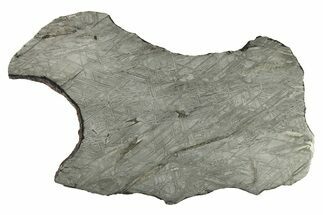This Specimen has been sold.
1.48" Etched Muonionalusta Meteorite Slice (7.9 g) - Sweden
This is a 1.48" wide (7.9 gram) slice of the Muonionalusta meteorite collected in Sweden. This thin slice has been etched to better show the internal structure and coated to help prevent rusting.
Comes with a floating frame display case.
The Muonionalusta Meteorite
Muonionalusta is one of the oldest known meteorites found on Earth: it is estimated to have impacted around 1,000,000 BCE. It experienced four Ice Ages before it was found in 1906 just west of the Sweden-Finland border in northern Scandinavia, near the Finnish Muonio River. Hence, its name translates as "downstream of the Muonio River" in Finnish. It is an IVA (Nickel-Iron) meteorite, and about 230 kilograms have been discovered from an impact area of about 130 square miles, within the Arctic Circle. It is most likely the ejected mantle or core of a planetoid.
Besides being the oldest and one of the largest meteorites ever discovered, Muonionalusta is also the first meteorite discovered to contain stishovite, a very rare form of quartz formed under immense pressure. A 2010 study using lead isotope dating on the Muonionalusta meteorite concluded the stishovite was from an impact event hundreds of millions of years ago. It indicates that Muonionalusta's parent body was "heavily shocked, possibly during the 0.4 Ga [billion years] old breakup event indicated by cosmic ray exposure".
About forty pieces of the meteorite are housed in various institutions around the world. The largest, weighing about 25 kilograms, is on display at the Moldavite Museum in the Czech Republic. It is popular among collectors for both its staggering age and its spectacular Widmanstätten patterns. Pieces of it have even been used for faces in luxury watches and included in components and paint for special edition luxury cars.
Muonionalusta is one of the oldest known meteorites found on Earth: it is estimated to have impacted around 1,000,000 BCE. It experienced four Ice Ages before it was found in 1906 just west of the Sweden-Finland border in northern Scandinavia, near the Finnish Muonio River. Hence, its name translates as "downstream of the Muonio River" in Finnish. It is an IVA (Nickel-Iron) meteorite, and about 230 kilograms have been discovered from an impact area of about 130 square miles, within the Arctic Circle. It is most likely the ejected mantle or core of a planetoid.
Besides being the oldest and one of the largest meteorites ever discovered, Muonionalusta is also the first meteorite discovered to contain stishovite, a very rare form of quartz formed under immense pressure. A 2010 study using lead isotope dating on the Muonionalusta meteorite concluded the stishovite was from an impact event hundreds of millions of years ago. It indicates that Muonionalusta's parent body was "heavily shocked, possibly during the 0.4 Ga [billion years] old breakup event indicated by cosmic ray exposure".
About forty pieces of the meteorite are housed in various institutions around the world. The largest, weighing about 25 kilograms, is on display at the Moldavite Museum in the Czech Republic. It is popular among collectors for both its staggering age and its spectacular Widmanstätten patterns. Pieces of it have even been used for faces in luxury watches and included in components and paint for special edition luxury cars.
TYPE
Iron (IVA)
LOCATION
Sweden
SIZE
1.48 x .82", 0.12" thick, 7.9 grams
CATEGORY
SUB CATEGORY
ITEM
#263106
 Reviews
Reviews












